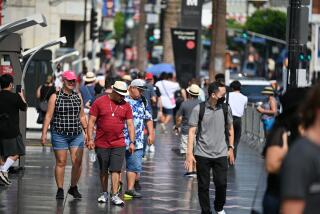Rooting for the Games’ end
- Share via
Beijing
Li Qiang can’t wait for the Olympics to end Sunday.
He had expected his Sichuan restaurant, a couple of miles from the Olympic village, to be packed with tourists during the Games. But it’s been unusually quiet. One day this week, business was so slow that Li let two of his seven staff members go home in the middle of the lunch hour. Three others sat in the corner watching television.
“Everybody thought the Olympics would be great for business,” he said. “It turned out differently.”
Many owners of small restaurants, hotels and shops in Beijing are wearing long faces this summer, especially those who poured their life savings into buying businesses or sprucing up their shops ahead of the Games.
About half a million foreign visitors were expected in Beijing this month. But many businesspeople think that because of stricter visa rules and other hassles, there are no more here now than there were last August, when 420,000 visitors from abroad came to the capital. In July, Air China, the nation’s flagship carrier, saw its international passenger traffic fall by 19% from a year earlier.
The number of domestic tourists has also been lower than expected. Fearing inflated prices for hotels and airline tickets, many Chinese apparently decided to watch the Games at home.
Wang Zhenghui, director of China’s Hotel Assn. in Beijing, reckons that occupancy during the Olympics has been running about 50% to 60%. That’s a far cry from the 70% to 80% hoteliers were expecting.
The 120 or so larger facilities designated as Olympic hotels are doing better, Wang said, as many had locked in bookings months in advance. But some of them have had to reduce their rates to fill rooms.
Apartment owners, too, had hoped to cash in on the bonanza, with some jacking rents up to five times normal levels, according to the official New China News Agency. But of more than 20,000 apartments posted for short-term rent, only 8,000 were leased during the Games, it said.
In a traditional Beijing hutong neighborhood near the centuries-old Drum Tower, a popular tourist attraction, the new owner of the Shuangsi, or Double Temple Hotel, had the Olympics in mind when he borrowed about $140,000 to buy the two-story building at the end of last year.
Even at a discounted rate of less than $20 for a single, only half of the 27 rooms are now occupied, said the 32-year-old, who would give only his surname, Li.
Li said tighter security checks on his industry were also hurting. Hotels in China have long submitted daily guest lists to local police, but until this summer, he said, it was just a formality. Now officials are going through them carefully. Not wanting any trouble, Li said, he’s been turning away Chinese guests without proper ID cards. He doesn’t even bother with foreigners, whose registrations get extra scrutiny.
For the Olympics, Beijing authorities have temporarily closed down many karaoke rooms and other bars and erotic entertainment places deemed unfit, along with scores of factories, construction projects and other businesses that might dirty the air or the city’s image.
Many of these establishments are counting on life returning to normal after the Games.
“Otherwise it would be too inconvenient for people . . . and will largely decrease the efficiency of the city,” said Hu Xingdou, a professor of economics at Beijing Institute of Technology. “Actually, nowadays, many ordinary people sincerely hope that the Games could finish sooner.”
Even at the Silk Street Market, notorious for its wide selection of counterfeit goods, merchants and salespeople weren’t ruing the end of the Olympics.
“Business is a little better because of the Olympics but not a whole lot,” said Zhang Yanjuan, a saleswoman at a shop selling fake Polo and Abercrombie & Fitch shirts, on an afternoon when the multistory mall on the city’s east end was jammed with crowds of foreigners, including athletes. “Everybody said that when the Olympics come, we would make a small fortune. But everybody was wrong.”
--
--
Cao Jun in The Times’ Shanghai Bureau contributed to this report.
More to Read
Go beyond the scoreboard
Get the latest on L.A.'s teams in the daily Sports Report newsletter.
You may occasionally receive promotional content from the Los Angeles Times.







